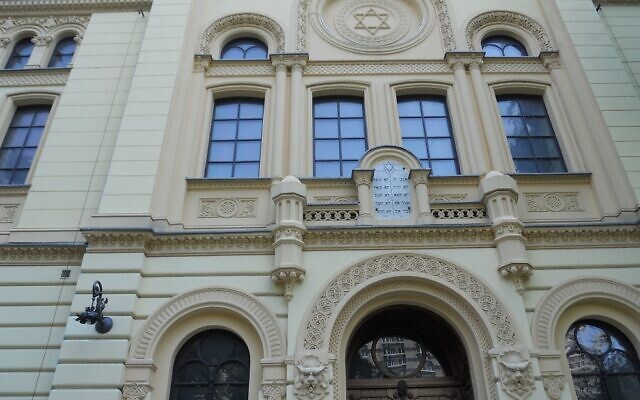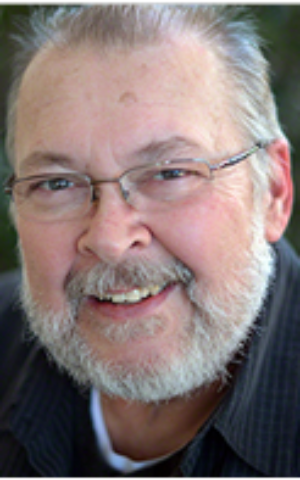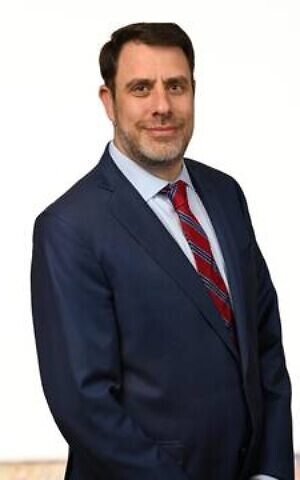Local Minister Receives Reconciliation Award in Poland
The Polish Council of Christians and Jews honored Steven Reece.

A local Baptist minister, Steven D. Reece, who has focused the last nearly two decades on fostering reconciliation between Jews and Christians, primarily in Poland, was awarded the Figure of Reconciliation for 2022 by the Polish Council of Christians and Jews.
The ceremony occurred at the historic Nozyk synagogue in Warsaw and was hosted by the Chief Rabbi of Poland, Michael Schudrich.
Reece was asked by the council to speak, in Polish, about his “activities, motivations, [and] the lessons [I’ve] learned and want to pass [on].” Reece has been in Poland on a Fulbright Scholarship and won’t be returning to Atlanta until the end of July. “For my Fulbright Scholarship, I am teaching and conducting research in collaboration with the Historical Institute of the University of Szczecin,” he said.

This is not, by any means, Reece’s first introduction to Poland. A professional photojournalist, Reece initially was drawn to Poland in 1988 after seeing photographs of Christians living in Communist Poland. Then, after studying at a U.S. seminary, he returned to Poland in March 1997, which is when he began to understand the complex relationship between Poles and Jews. An off-hand comment by a waitress in Otwock, outside Warsaw, led him to the local Jewish cemetery.
“I began to research why cemeteries were important to Jews. I saw a website about a Polish Jewish cemetery restoration association, and I was hooked,” he says. “I feel I owe a debt to Jews for being a vessel of G-d. On a practical level, for me, the outcome isn’t the restoration of a cemetery, but the restoration of a relationship which was endearing. Jews gave birth to Christianity. And a great evil was perpetrated [against them],” he notes, referring to the Holocaust.
“It should be Christians who take the first step because the Shoah happened during the Christian reign in a Christian country,” he says. “Ninety percent of the people were Christian. The theological aftermath of the Shoah was very difficult. We were viewed as perpetrators, or people who just stood idly by. Christians must understand the Jewish perspective of the Shoah. Our response should be one of justice. The essence of this is mercy and loving kindness, which is the highest expression for Jews. I felt we, as Christians, could go into this no-man’s land between Christians and Jews.”
In 2010, he launched the Matzevah Foundation, which organizes Jewish cemetery restoration projects in Poland that include Christians, Jews, and local Poles. The Matzevah Foundation’s first project was in 2012 in Zambrow, Poland. Although the members of the board of the Matzevah Foundation are Christian, and the work the organization has done in Jewish cemeteries in Poland has been accomplished by Christians, both Baptist and Catholic, Reece’s goal has always been to include Jews in his restoration projects. He points out that it’s considered a mitzvah for Jews to take care of their cemeteries.

Initially, he didn’t receive much response when he reached out to the American Jewish community. One rabbi, who not only responded but has developed a friendship with Reece, is The Temple’s Rabbi Peter Berg. When Berg heard of the award Reece is receiving, he told the AJT, “I’m delighted to see Steven receive this award for his extraordinary work in reconciliation. Steven and the Matzevah Foundation are most deserving of this high honor.”
For his part, Reece said, “I am surprised by this honor. I did not expect it; however, I am incredibly grateful to be recognized in this manner. Second, it is essential to realize that my aim in leading the mission of The Matzevah Foundation is to bring Jews and Christians together to care for and restore Polish-Jewish cemeteries. I lead Jews of the Diaspora and the Polish-Jewish community to work with Polish Christians, non-religious people, government and community leaders, teachers, schools, universities, and community activists in caring for the Polish-Jewish heritage as found in the Jewish cemeteries of Poland. Consequently, I share this recognition with those with whom I collaborate and lead. It is indeed a collaborative effort.”
“Finally,” he added, “I am learning that our collaboration opens pathways for dialogue and reconciliation—a way of reconnecting and discovering new options and outcomes, which provide insight, and new ways of interacting. Receiving such recognition as a person of reconciliation indicates to me at least that I am on the right path.”
I am learning that our collaboration opens pathways for dialogue and reconciliation—a way of reconnecting and discovering new options and outcomes, which provide insight, and new ways of interacting. Receiving such recognition as a person of reconciliation indicates to me at least that I am on the right path.
Reece explained that for his Fulbright Scholarship program he has been “traveling across Poland since mid-October to meet with and interview dedicated Poles who are preserving their communities’ Jewish heritage through Jewish cemetery restoration projects. My research explores the diplomatic model of ‘cultural stewardship.’ In this concept, the steward/caretaker takes care of what belongs to someone else.
“So, my study has in it a goal of addressing the long-standing problems arising from the Holocaust in the preservation of Jewish material and cultural heritage of Poland. Investigating such a model for connecting, mobilizing, and facilitating stakeholders involved in Polish-Jewish cemetery restoration projects can open the way to preserving Polish-Jewish heritage and solving fundamental problems in Jewish-Christian relations after the Holocaust. From my research, I plan to present findings at seminars and conferences, write articles, and, ultimately, write at least one book.”
- News
- Community
- Jan Jaben-Eilon
- Steven D. Reece
- Baptist minister
- Figure of Reconciliation
- Polish Council of Christians and Jews
- Nozyk synagogue
- warsaw
- Chief Rabbi of Poland
- Michael Schudrich
- Fulbright Scholarship
- Historical Institute of the University of Szczecin
- Shoah
- holocaust
- Matzevah Foundation
- Rabbi Peter Berg
- The Temple
- Diaspora



comments